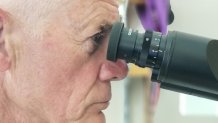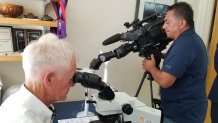Cutting-edge research is revealing new ways to potentially prevent violent acts, including mass shootings, years before the thought of violence ever crosses the minds of murderers.
A study of roughly 1,000 prisoners revealed across-the-board brain abnormalities in those who committed homicide, leading researchers to believe such behavior, if identified early enough, can be quashed with therapy and medication.
The findings come in the wake of several recent mass shootings across the country – seven dead in Odessa, Texas; 22 shot and killed at a Walmart in El Paso, Texas; and three people, including two children, killed by an active shooter at the Gilroy Garlic festival.
Researchers have linked such violent behavior to abnormalities in the brain, and believe early detection may help identify who might be at risk of committing violent attacks in the future.
"I think we're getting there in terms of finding areas of the brain that may explain homicidal behavior," said Dr. Hannes Vogel, the director of Neuropathology at Stanford University.

'The [Brain] was Hand Delivered to Me'
Local
On a typical day in his laboratory, Vogel dissects brains in search of tumors and diseases. Two years ago, however, he was pulled into a criminal investigation following the Las Vegas mass shooting that left 58 dead and hundreds injured. The Las Vegas County coroner sought his help in examining the brain of the mass shooter.
"I happened to be on a speaking engagement in Europe and got a call in the middle of the night, and they said they wanted to send me the brain, and it was hand delivered to me," Vogel said.
The brain belonged to Stephen Paddock, 64, the suspected shooter in Las Vegas.
"I was asked to diagnose and rule out certain disease processes that might have contributed to his behavior," Vogel said.

Dissecting the Brain of a Mass Killer
He set out to conduct the examination the same way he began any of the thousands of other dissections he has undertaken during his career.
"I would take a scalpel and cut out a portion of the brain, and that ultimately ends up as a slice on a microscope slide with special stain that I look at under the microscope,” he said.

Unusual Amounts of Scarring Found in Brain of Las Vegas Mass Shooter
"[Paddock] took his own life with a bullet wound to the to the back of the brain, but it still left a considerable amount of the brain that was amenable to examination," Vogel said.
In the shooter’s brain, Vogel found large amounts of what can be described as a type of scarring of the brain tissue. The scientific term for it is corpora amylacea. These large, complex molecules accumulate in the brain during the aging process and can be present with various brain diseases, including Alzheimer’s and Parkinson’s. What stood out to Vogel was how much was found.
"The quasi-scarring process in the brain was higher than the average 60-something-year-old male," he said.

Inmate Brain Testing Set Out to Demystify Minds of Murderers
It's worth noting that Vogel found this condition on areas of the brain that are responsible for decision-making, emotion and anger. The corpora amylacea, however, is not well understood in neuroscience, and Vogel was unable to draw any connection to the shooter's behavior.
"The significance of it is totally unknown," he said.
More than 1,000 miles away, in another lab at the University of New Mexico in Albuquerque, research inside prisons is revealing even more about the minds of murderers.
“Prevention – that is the ultimate goal,” said Dr. Kent Kiehl, neuroscientist and psychologist at the Mind Research Network.
Keihl, a professor at the University of New Mexico, set out with his team to scan the brains of murderers. To do that, they built a mobile MRI brain scanner, fitted it into a large truck and drove the machine across the county to 10 prisons.
"The prisoners are very happy to participate in the research, " Kiehl said. “That gives them an opportunity to interact and talk with an expert ... who is going to give them a chance to confidentially talk about all their problems and issues which they may not want to share with anybody else."

Brain Scans Conducted on Nearly 1,000 Inmates
In the last decade, the team has scanned the brains of 998 prisoners. The findings show the brains of killers stand out significantly compared to the rest of the population.
"There are regions of the brain in individuals who've committed a homicide that truly are different than … their peers," Kiehl said.
His latest study, released this year, shows specific sections of the brain, responsible for controlling emotions, impulses and social awareness, are less developed among those who have killed someone.
"We're finding for the first time that they are quite different," Kiehl said. “So now, it's a question of how did they get that way? How might we understand this information?"

Are Murderers Born with Violent Tendencies?
Kiehl believes people are born with those brain differences and says therapy or even medicine can physically transform the brain to reduce the risk of dangerous behavior.
"We're going to try to implement treatments that we know work on those systems of the brain. Then we would hopefully see changes that would prevent these types of things from ever happening," he said. He believes learning a skill like juggling or a foreign language may, in some cases, be enough to rewire the deficient circuits of the brain.
There are potential ethical hurdles in identifying patients, including children, as having a predisposition for violence. Kiehl, however, said he is already receiving requests from parents, around the country and abroad who want their kids tested. The scans and analyses run about $10,000 per child, but it could very well be years before this type of testing becomes widely available in the Bay Area or at other medical centers across the country.
“I really do believe that it will be helpful for developing treatments for developing things that would be relative to prevention,” Kiehl said. “That’s really the ultimate goal of the work.”
______________________________________
Need to contact our Investigative Unit?
• You can remain anonymous
• 1-888-996-TIPS
______________________________________



